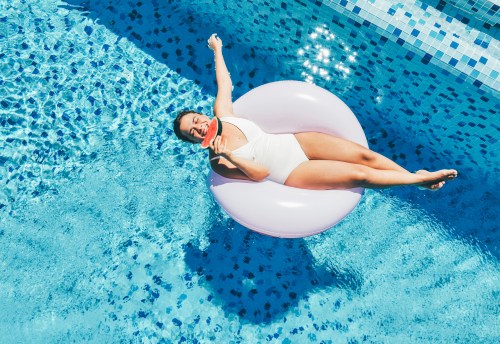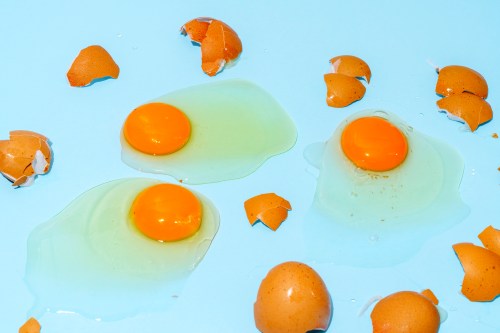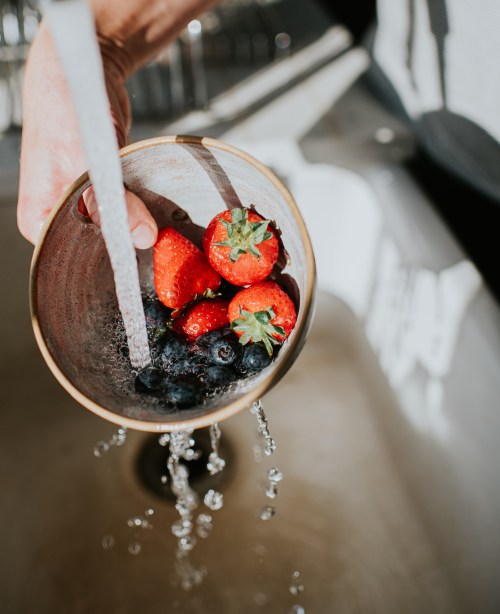Do You *Actually* Need To Wait To Swim After Eating?
Experts say it's complicated, but before you dive in: Here's how the age-old advice got started.

Every summer, whether poolside or near the ocean, you may think to yourself: 'Wait thirty minutes after you eat before getting back into the water.' This arbitrary time, which was heard ubiquitously throughout childhoods, came with warnings of stomach aches, and other terrible ailments that would *definitely* result from getting in the water too soon after eating. A seemingly omnipresent piece of advice in many peoples' lives, this "fact" became one of the long-standing safety issues (along with stuff like reapplying sunscreen, and avoiding bug bites) we think of around summertime.
Experts in This Article
Christopher R. Mohr, PhD, RD, is a registered dietitian and the co-owner of Mohr Results, Inc.
New York-based registered dietitian
But, is this really medically sound advice? Or merely an unsubstantiated myth that caught on with surprising fervor? Can you indeed swim right after eating with no consequence? In an effort to bust a myth, I explored the science behind the common admonition and spoke with medical experts who helped me get down to the bottom of this claim.
Can you swim right after eating?
According to Christopher R. Mohr, PhD, RD, the co-owner of Mohr Results, Inc, the answer isn’t binary. “What you eat before you swim will play a role in how you feel,” says Dr. Mohr. “I wouldn’t suggest sitting down to a massive holiday meal and running immediately into the water to do laps, but the right foods and fluids before swimming can actually help you feel better when swimming.” Luckily, summertime foods tend to lean on protein-rich offerings and fresh, crunchy veggies; foods that are more likely to fuel you than prime you for a nap.
With scorching temps poolside, something else to pay attention to is actually hydration. Dr. Mohr notes that dehydration “could certainly cause performance issues. Even just a 1 percent body weight loss from fluids can negatively impact physical and mental performance.” Experts suggest a cup of water every 30 minutes when laying poolside.
It is important to consider the variables of how much food is consumed as well as the extent of the swimming: Are you just lounging in the water or are you undertaking a rigorous water-based marathon of sorts? Regardless, it is doubtful that as long as both of those things are in moderation, there shouldn’t be an extreme risk of drowning due to cramping, overeating, or exertion.
According to Melissa Rifkin, MS, RD, CDN, “everyone digests foods differently, and while some have sensitive stomachs that are easily upset, others have stomachs of steel," she says. "However, those who notice frequent digestive upset for any variety of reasons, like food sensitivities, stress or digestive disease, should err on the side of caution and allow some time to pass before jumping in the pool.” While some people are "perfectly fine," clearly, there is no one-size-fits-all answer to this question.
Exercise *can* disrupt your digestion, however
As Rifkin notes, the science behind the cramping theory has to do with the body’s blood flow during digestion. “Following a meal or snack, your body increases blood flow to your digestive organs to aid in digestion," she says. "However, when you engage in exercise right after eating, your body is conflicted on how to send that blood flow to the digestive organs or to the skeletal muscle that is now requiring more oxygen due to increased movement." Essentially, when your blood flow is redirected to your muscles and less is sent to the organs trying to digest food, digestive distress issues like diarrhea and cramping are more likely to pop up.
There is another type of abdominal pain that can result, known as exercise-related transient abdominal pains—or ETAPs—but again, unless the swimmer is undertaking a very physically demanding exercise regimen, it’s doubtful that these issues would ever be immensely affecting. Furthermore, there is no evidence claiming that eating prior to swimming would directly cause either a stomachache or ETAPs.
Rifkin also notes that the contents of what we eat is indicative of how we might digest. “Digestive distress is more likely to happen after a meal that has a higher content of fat and protein," she states. "Compared to carbohydrates, these two nutrients require more blood flow and oxygen in order to be digested." Overall, eating a reasonably sized, carb-focused meal before swimming likely won’t have a significant impact on your stomach, but a meal higher in fat and protein might.
How to avoid a stomach ache after eating before swimming
As a former competitive swimmer, Dr. Mohr says the best fuels for his body prior to swimming and other exercise are dried figs and yogurt. The figs are “an all-natural energy source” that adds flavor “without any added sugar,” while the yogurt “adds a bit of protein” to help “repair and rebuild” muscles. The key is to eat food that energizes, but doesn’t weigh you down.
In the case that you do overeat or overexert yourself and actually do cramp up in the pool, “stop swimming temporarily, work on deep breathing or stretching, to allow you to feel better and to bring your heart rate down," advises Dr. Mohr. "Once you feel like you’ve recovered, go back to it or if needed, stop there and try to build your training volume or intensity the next time you hit the water.”
So, how did this 'wait to swim' myth even start?
Where did all of this originate, you might be wondering? Believe it or not, a Boy Scouts manual from the early 1900s actually includes the absurd line that “it will be your own fault” if the Boy Scout hopeful reading the guidebook were to foolishly eat too much, cramp while swimming, and ultimately drown.
Rather recently, The American Red Cross actually released a document assuring readers that they were fine to eat and swim without taking a mandated 30 to 60 minute break in between, deeming it a “myth.” While our experts’ opinions were more carefully balanced, we don’t think there’s any need for overt nervousness in regards to mandating a strict timeline between eating and swimming.
Also, we know that there may still be a sense of internalized guilt for anyone who grew up hearing the claim, but don’t worry—barring any egregiously large meals and/or especially challenging synchronized swimming, you should be able slip back into the pool after eating without any major concern. .shop-2021-email-capture-form .signup-form__submit{ background-color: black!important; color: white !important; }










